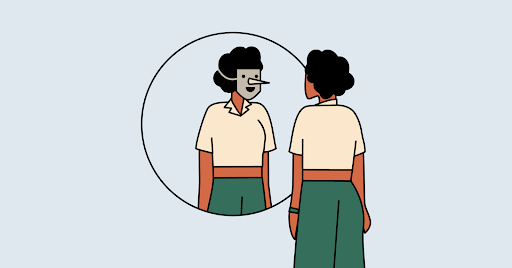Entering my first year of university, I expected everything to be the same. I should just do well because that was what has always come naturally to me. Until it didn’t.
My first assignment was a blog post summary about a current issue. I expected a decent mark. The assignment seemed straightforward enough. When I received my mark back, my biggest fear was reflected back at me. I had passed but barely. I was not prepared for the onslaught of emotions I had felt.
Each negative thought chipped away until my self-confidence was at an all time low. I began to believe that I did not belong within my program. My acceptance into school was just pure luck. It was only a matter of time before I was found out to be a fraud.
To compensate I thought I had to do everything. I pushed myself to my limits, neglecting other aspects of my life. I joined various clubs, worked various jobs and took every opportunity even though I didn’t have a passion for them. All just to prove to myself that I wasn’t a failure.
My experience is not unlike many others who feel undeserving of their success. ‘Imposter syndrome’ is a common phenomenon where it is difficult to acknowledge our success, or we doubt our own capabilities, despite no evidence of us being incapable. Imposter syndrome affects everybody no matter how high-achieving or eminent we may be.
From the students surveyed by Brigham Young University, around 20% of them reported having experienced imposter syndrome. Women of colour, women in STEM, and international students are the groups most likely to feel imposter syndrome. Environments like university only serve to exacerbate imposter syndrome as students are under constant scrutiny and assessment.
Despite earning my place at university, I still could not reconcile the years of hard work and effort I made to get myself to this position. My mental health deteriorated drastically.
In the current day, it is hard not to be caught up in feelings of self-doubt and failure. There is intense social pressure placed on people in the age of social media. Everybody’s successes are plastered on our feeds to remind us of our own insecurities. There is constant pressure to do better and be better because everybody is watching. The wave of hustle culture promotes that ideals of just being a student or just working one full time job is not good enough. Society has completely intertwined people’s worth with how productive they are or what they have achieved.
This distorted portrayal of reality is at our expense, leaving people feeling powerless, unmotivated and purposeless. Especially if you already have imposter syndrome, it creates an unrealistic view of what success is. We will never be perfect because society’s ideals of perfection are unattainable. When we inevitably fail to meet those expectations, our feelings of ‘imposterism’ only multiply.
Dr. Valerie Young, an expert in imposter syndrome noted that, “A sense of belonging fosters confidence. The more people who look or sound like you, the more confident you feel. And conversely, the fewer people who look or sound like you, it can and does for many people impact their confidence’’. I started sharing my feelings with my closest friends and many echoed the same insecurities I did. They were all as accomplished, if not more than me, yet still believed themselves to be undeserving of their success. I was not alone for the first time.
That’s when I came to a realisation. I had to make a change, or I did not know how long I could continue. The biggest lesson I learned was that it is important to remember that we are humans, with complex emotions, and it is easy to be caught up in ideas of what being ‘successful’ looks like.
Overcoming imposter syndrome during my Freshers year took intentional energy and work. I had to learn just because I did poorly on one assignment did not mean I was undeserving. I intentionally worked on the things I was insecure about and learned how to treat myself with compassion anytime I experienced ‘failure’.
I changed my inner narrative to stop thinking about myself as an imposter. I was a student learning things for the first time. I was going to get things wrong a lot and that was okay. That’s why I came to university. My self-worth should never be tied up in academic achievements or people’s perceived vision of my success. I learned that no matter how successful I became, I would never feel like a fully-realised whole individual unless I found fulfilment in myself. I had to become intentional with my inner narrative about myself and my definition of success.
Going through my feelings of imposter syndrome in the first year has given me a new perspective on life. I have appreciated my school experience and life much more than ever before. I have created pockets of joy in even the messiest, ugly parts of life. I learned to treat myself with kindness and be much more emotionally available to the people around me. Most importantly, I learned I could be the person I always dreamed of being just by being the best version of myself.

